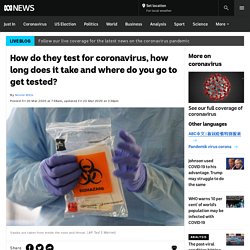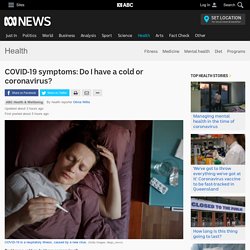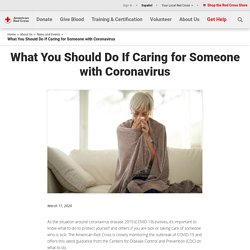

How do they test for coronavirus, how long does it take and where do you go to get tested? Not everyone who wants a COVID-19 test will get one.

Australia doesn't have enough to go around, so doctors are being asked to limit tests to those most likely to test positive. These include people who: Have recently been overseasHave been in contact with a known caseHave been hospitalised with pneumoniaAre frontline health workersAnd, as of Friday, aged care workers. Tips to Recognize & Cope with Coronavirus Trauma - PLUS Model Magazine. Last updated:April 3, 2020 As the world finally begins to wrestle with the true impact coronavirus will have, millions are grappling to cope with a trauma without any of the mental tools necessary.

Entrepreneurial guide, Cassandra Shuck, has created a mental-health toolbox to help you through these tumultuous times. Cassandra’s Tips for Recognizing Trauma: Check in with emotions: Whether or not the coronavirus has directly impacted you, it’s normal to feel anxious, scared, and uncertain about what the future may hold. What happens when someone gets coronavirus, what are the symptoms as it gets worse and how can it kill? - Science - ABC News. Chances are if you get sick from the latest coronavirus you'll get a pretty mild illness.

About 80 per cent of people with COVID-19 will have a "mild to moderate illness that lasts about two weeks," said Sanjaya Senanyake, an infectious diseases specialist from the Australian National University. However, some people will develop more severe disease with COVID-19. According to the World Health Organisation, 15 per cent of coronavirus cases are severe infections that require oxygen, and 5 per cent are critical infections, requiring ventilation. "For COVID-19 at the moment, the global case fatality rate is over 3 per cent, although we think it's probably closer to 1 per cent," Dr Senanyake said. But the true mortality rate will take some time to fully understand, as there are many mild cases likely not yet reported. How the virus makes people sick The first thing to know is that viruses work by hijacking the machinery inside your own body's cells to make more copies of themselves. COVID-19 symptoms: Do I have a cold or coronavirus? - Health - ABC News.
Do I have a cold or do I have coronavirus?

It's a question any of us feeling unwell may have asked ourselves in recent days and weeks as COVID-19 cases rise. While the odds of your having COVID-19 are much lower than the likelihood of your having the common cold or flu, it's important you know what to look out for — and where you can get help. What are the symptoms of coronavirus? The most common symptoms of COVID-19 are fever, tiredness, and a dry cough. Some people also experience a sore throat, runny nose, shortness of breath, nasal congestion, aches and pains, or diarrhoea.
Symptoms: How can you tell if your child has the virus? Signs to look for. Can coronavirus spread through food? Can anti-inflammatories like ibuprofen make it worse? Coronavirus claims checked by experts. Editor’s note: Here are some of the top coronavirus and COVID-19 claims our readers said they’d like to see tested against the research evidence.

We asked these public health and infectious disease experts to explain. 1. Is herd immunity a good strategy? Herd immunity is not part of the Australian strategy for controlling the outbreak. On social media there are many people calling for stronger and faster government responses, including “shutting everything down.” Some have claimed the Australian government has plans to rely on “herd immunity” to control the outbreak. The decision not to close schools is based on data from China, which show that there’s no sign of children and young people playing a role in “chains” of transmission. The development of immunity is an important question for the longer term management of COVID-19, the coronavirus at the centre of the pandemic. 2.
Myth. But if they make you feel calmer and healthier, they can’t hurt. 3. Myth. 4. 5. 6. 7. Unlikely. 8. Nope. 13 Coronavirus symptoms to look out for by those who have had it - Gloucestershire Live. The spread of Coronavirus has been on the nation’s mind in the past week with the pandemic seeing hundreds more cases every day.

Restaurants, pubs and shops are shutting their doors across the UK and the rest of the world as schools struggle to cope with staff shortages and some are forced to close partially and completely. But in the midst of panic-buying and social isolation to prepare for the spread of COVID-19, many are wondering what symptoms they should be looking out for in their children, families, friends and themselves. Somerset Live reports that since the outbreak was announced in Wuhan back in December 2019, medical professionals have been continuing research into the symptoms of the virus and how they can be treated.
Health experts say that the risk of becoming critically ill remains low and not everyone who contracts the virus will become ill. 4 Reasons To Use A Humidifier During Flu Season. Humidifiers are invaluable tools that can help boost your indoor comfort, soothe your baby’s delicate respiratory system, and even reduce heating costs during the cold winter months.

But did you know that humidifiers also have another important purpose? They can help you stay healthy during flu season. Read on to learn 4 reasons you should be using a humidifier right now. Reason 1: Humidifiers May Stop the Spread of Flu and Other Viruses. Bridget was one Australia's first coronavirus cases. She reveals what happened next and how sick she really got. Updated 16 minutes agoThu 19 Mar 2020, 9:41am.

What You Should Do If Caring for Someone with Coronavirus. As the situation around coronavirus disease 2019 (COVID-19) evolves, it’s important to know what to do to protect yourself and others if you are sick or taking care of someone who is sick.

The American Red Cross is closely monitoring the outbreak of COVID-19 and offers this latest guidance from the Centers for Disease Control and Prevention (CDC) on what to do. Help the patient follow their healthcare provider’s instructions for medication(s) and care.Help with basic needs in the home and provide support for getting groceries, prescriptions and other personal needs.Stay in another room or be separated from the patient as much as possible.
Use a separate bedroom and bathroom, if available.Prohibit visitors who do not have an essential need to be in the home.Care for any pets in the home. The person who is sick should not handle pets or other animals while sick.Wash your hands frequently for at least 20 seconds or use a hand sanitizer that contains 60% alcohol. What To Do if You Are Sick.